Un Periódico Diferente / A Different Kind of Newspaper
Un Periódico Diferente / A Different Kind of Newspaper
Un Periódico Diferente / A Different Kind of Newspaper

Un Periódico Diferente / A Different Kind of Newspaper
Un Periódico Diferente / A Different Kind of Newspaper
Un Periódico Diferente / A Different Kind of Newspaper
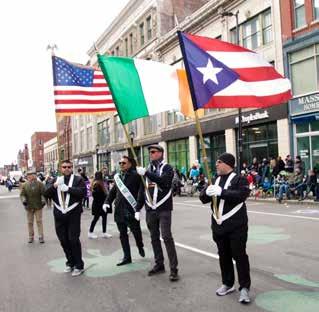
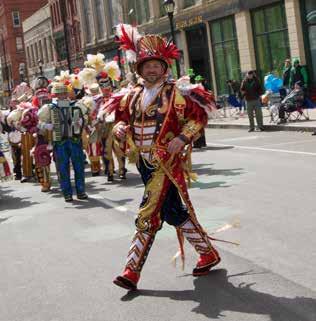
MARCH 19, 2023

Relationships between the Latino community and the region’s public media have not always been ideal. Despite the continuous growth of the Latino population in the region, our inclusion and participation in decision making processes that impact our community is still not what it should be. Here are some facts.
In February of 1980, the newly appointed general manager of WFCR 88.5 FM decided to cancel the program ¿Qué Tal, Amigos?, the station’s only program in Spanish. The widely popular show, co-produced and hosted by two Hispanics, Sonia Vives and Julio Torresoto, had been on the air for 10 years.
In January of 2007, two and a half decades after the ¿Qué Tal, Amigos? fiasco, the Latino community learned that the recently appointed administrator of WFCR 88.5 FM had made the decision to cancel the only Latino local show at the time, Tertulia. The equally popular program had replaced ¿Qué Tal, Amigos?
This new cancelation not only caught the Latino community by surprise but also opened old wounds. Once again, the administration of the public radio station had made a decision regarding programming without considering the preferences and needs of the Latino community. For more information about the cancellation of these two programs, please refer to our February 2007 edition OOPS… WFCR 88.5 Radio Did It Again!.
Moving forward to March of 2023 when the newly appointed manager of New England Public Media
(NEPM) announced the layoff of nearly 20% of its staff (full and part time) due to an ongoing financial crisis. New England Public Media is an alliance established in 2019 between New England Public Radio (WFCR 88.5) and WGBYTV.
Among those affected by the personnel cuts are the entire team of the weekly television show “Connecting Point” hosted by Zydalis Bauer. Zydalis Bauer had a long relationship with the Springfield-based television public media. In 2008, she began as an intern at WGBY’s Latino Youth Media Institute. She was then part of local productions and community engagement projects with the station. Later on, Zydalis became co-host of Presencia, the station’s first bilingual program. In 2019 she joined the Connecting Point team, becoming its host in 2021 as the first Latinx to host a prime time mainstream program. Another Latino casualty of the personnel cuts is Iohann Vega-Martínez, NEPM’s Media Lab Project Director. This project trained diverse innercity, middle school and high school students in the area of multi-platform storytelling and journalism. In January 2023, Iohann was one of three journalists from New England Public Media selected to participate in the inaugural 2022 New England Equity Reporting Fellowship.
These are just a few examples of how public communication media has repeatedly failed the Latino community. These most recent cuts constitute a serious setback to the relationship between NEPM and the community that they are supposed to serve.
2 Editorial/ Editorial
Déjà vu…NEPM and the Latino Community
3 Portada / Front Page Holyoke St. Patricks Parade 2023
4 Holyoke St. Patricks Parade 2023

5 UPenn Daniel Morarles Armstrong Black Puerto Rican History
7 Mellon Foundation launches new CUNY DSI program for threatened Dominican scholars
8 Educación / Education
STCC Class Taps into Students’ Love of Video Game Design
9 Museo UPR Amplía Su Colección Digital
HPS Teachers Receive 2023 Pioneer Valley Excellence in Teaching Awards
10 Finanzas / Finances
Spring Forward with Home Improvement Awareness
11 Cultura / Culture
New Community Mural Installation Coming to Holyoke
Mellon, Ford, Getty, and Terra Foundations Announce New Initiative Designed to Advance Latinx Art in Museums
12 Literatura / Literature
El grillo
14 Libros / Books
Dispatches From Puerto Nowhere
Velorio: A Novel
15 Deportes / Sports
STCC Wrestling Places 4th in National Competition in Puerto Rico
Founded in 2004 n Volume 19, No. 5 n April 2023
Editor Manuel Frau Ramos manuelfrau@gmail.com
413-320-3826
Assistant Editor Ingrid Estrany-Frau
Art Director Tennessee Media Design
Business Address El Sol Latino P.O Box 572 Amherst, MA 01004-0572
Editorial Policy
El Sol Latino acepta colaboraciones tanto en español como en inglés. Nos comprometemos a examinarlas, pero no necesariamente a publicarlas. Nos reservamos el derecho de editar los textos y hacer correcciones por razones de espacio y/o estilo. Las colaboraciones pueden ser enviadas a nuestra dirección postal o a través de correo electrónico a: info@elsollatino.net.
El Sol Latino welcomes submissions in either English or Spanish. We consider and review all submissions but reserve the right to not publish them. We reserve the right to edit texts and make corrections for reasons of space and/or style. Submissions may be sent to our postal address or via electronic mail to: info@elsollatino.net.
El Sol Latino is published monthly by Coquí Media Group. El Sol Latino es publicado mensualmente por Coquí Media Group, P.O Box 572, Amherst, MA 01004-0572.


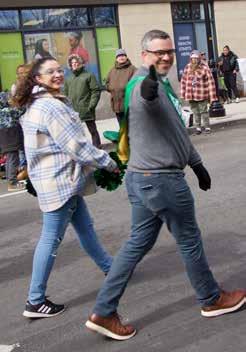
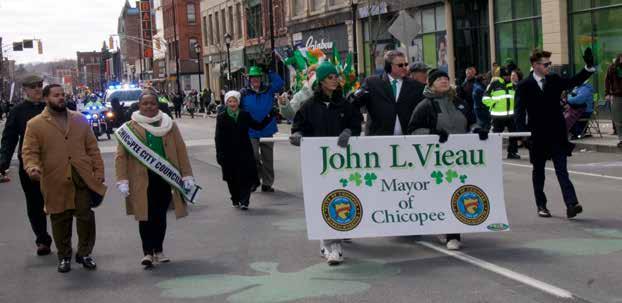


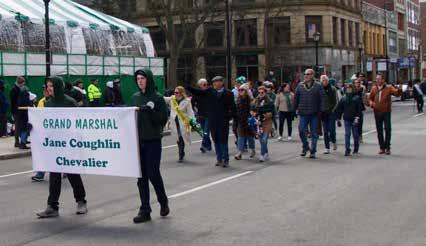








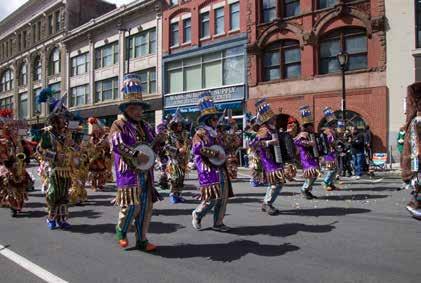


Sunday, March 29, 2023







Ph.D. candidate Daniel Morales-Armstrong’s research considers whose voices and narratives prevail and whose are plagued by silences.

February 22, 2023 – Poring over historical records at the Archivo General de Puerto Rico in Old San Juan, Africana studies and history Ph.D. candidate Daniel Morales-Armstrong made a discovery that would transform his research.
Morales-Armstrong describes sitting at a table inside that pale yellow, 19th-century Spanish neoclassical building, where he says he happened across a labor contract from 1873 for a 17-year-old girl named María Josefa. The document, he says, noted that even though she was free, she was required to work from sunup to sundown every workable day for a period of three years, all for the man who previously enslaved her. Her pay included living at his house, eating at his house, and four pesos a month.
On the left is Maria Josefa’s birth certificate, and on the right is the labor contract the man who previously enslaved her drafted when she was free. Image: Courtesy of Daniel Morales-Armstrong Throughout his research over the years, he says, he constantly bumped up against insufficient representation in the scholarship of Black Puerto Rican history and lived experiences.

“As I was doing my research, I was constantly wishing there was more. I wanted to know about my people’s histories—Black Puerto Rican history,” says Morales-Armstrong, whose family is from Ponce, in southern Puerto Rico, not far from María Josefa’s Santa Isabel.
Because of Puerto Rico’s colonial status with the United States, combined with its geographical position, this history often falls between the cracks, he says.
“In Latin American studies, oftentimes folks say, ‘Puerto Rico is part of the U.S., so we don’t need to include it.’ And in U.S. history oftentimes folks say, ‘You’re part of Latin America, so, we don’t need to include you.’”
Before he came to Penn, Morales-Armstrong taught, among other subjects, Black Latin American history to high school students in the Washington Heights and Bronx sections of New York City.
“At the time I didn’t know much about emancipation in Puerto Rico but this was a heartbreaking document for me to find. How was this freedom?” asks Morales-Armstrong. “Aside from a bit of pocket change, it sounded a lot like slavery to me.”
Finding that document led Morales-Armstrong on a journey to discover María Josefa’s story and, in turn, revealed a much larger story about how the freed people in her small town of Santa Isabel engaged in a collective labor strike, one that the Spanish colonial government tried to erase all evidence of. In fact, he says, freed people across other communities along the southern Puerto Rican coast also engaged in varied forms of resistance to the forced-labor mandate during this time.
“In trying to find María Josefa’s story I found that there was this larger story happening in terms of resisting the afterlives of slavery in Puerto Rico, and that research has just grown through my time at Penn,” he says.
“These experiences inform my approach to history: considering whose voices, histories, and narratives prevail, and whose are plagued by silences,” he says. He ran up against those silences time and again in researching the resistance to the forced-labor mandate in Puerto Rico.
“The dominant narrative in the history books in Puerto Rico and the Atlantic world is that emancipation was a complete success and that there were no issues whatsoever, which would make Puerto Rico a very significant outlier,” he says. “Everywhere else in the hemisphere, with the end of slavery came conflict over labor control. Former slaveowners were trying to figure out how to continue to exploit the labor of these newly emancipated people.”
The land outside Ponce, Puerto Rico, that once was the Hacienda Florida, the sugar cane plantation behind where Maria Josefa lived. Image: Courtesy of Daniel Morales-Armstrong.
continued on page 6
With the 150th anniversary of the abolition of slavery in Puerto Rico approaching on March 22, now is an important time to revisit the stories of emancipated Black Puerto Ricans, Morales-Armstrong says.


He expects to find more concentrated collections about the reaction to abolition in the archives of Puerto Rico and has been surprised at how the past five centuries of colonialism have impacted the mechanics of doing his research.
“There are times when I get to an archive and the catalog says that what I’m looking for is in this box, and I get to that box and there will be a gap. The documents are taken out, and there’s no forwarding address. The archivist will tell you, ‘Oh, yes. These documents are probably in Spain.’ But it’s not clear where.”
He gives an example of searching a regional archive for records of the police who went to quell public disturbances and who would have likely been called in to address any resistance to labor contracting.
“The Spanish administrators in Puerto Rico loved to write detailed documents patting themselves on the back; the public order police at the time wrote in depth weekly updates on their activities in the Ponce area,” he says. “In the Spanish archive to which the documents I was looking for were extracted, I found two years of weekly documents turned into a three-page summary saying, ‘We did a really great job during this time, and we had no issues.’ Something’s up there. It’s revisionist history at the colonial level,” Morales-Armstrong says.
On the left is Maria Josefa’s birth certificate, and on the right is the labor contract the man who previously enslaved her drafted when she was free.
Image: Courtesy of Daniel Morales-Armstrong
As a result, he says, he’s been forced to be more creative in his research in order to work around these gaps in information.
“Emancipation in Puerto Rico is an important but understudied topic,” Morales-Armstrong says. “The stories of free people’s agency in that moment of emancipation were very clearly silenced by the Spanish empire and the British empire at the time, and those in official roles had an intentional hand in silencing the stories.”
Understanding, researching, and revisiting the story of emancipation in Puerto Rico is crucial because the current history leaves questions for Black Puerto Rican people interested in learning about the past, Morales-Armstrong says. He hopes other Black Puerto Rican people take up the study of the island’s history to help continue to fill in the gaps created by colonialism.
Morales-Armstrong’s advisor Grace Sanders Johnson, an assistant professor in Africana studies, says he is an exemplary emerging scholar.
“Of course, his academic work is intellectually rigorous, but I most impressed with Daniel’s intentionality to build systems of learning and engagement for future communities and scholars,” she says. “His work, then, encompasses a particular kind of thoughtfulness that advances the historical understanding of Black Puerto Ricans and also functions as an invitation to create archives for future scholars.”
Another advisor, Roquinaldo Ferreira, agrees.
“Daniel combines an incredible worth ethic with great intellectual creativity,” he says.
Morales-Armstrong says it is important to recognize that Black history is multifaceted and there is value in learning about Black history across the diaspora, be it in Puerto Rico, in the United States, in Mexico, or in Jamaica.
“Though iterations of Black History Month now exist throughout the hemisphere, the origin of the celebration as we know it is from the U.S., started by African-American historian Carter G. Woodson,” MoralesArmstrong says. “When we think about Black history, we need to look at African-American history here, Black history in the global African diaspora— like my work in Puerto Rico—and across the African continent. In this regard, it becomes clear that if we are to know and honor Black history, we are necessarily called to do this work well beyond the month we are in.”
NEW YORK, NY | CUNY DOMINICAN STUDIES INSTITUTE | January 26, 2023 - In a blow against intellectual oppression, the Mellon Foundation is funding a three-year $750,000 fellowship program at The City College of New York-based CUNY Dominican Studies Institute (DSI) for threatened Dominican scholars globally. Beginning in the fall, the program will enable intellectuals ranging from scholars, artists, writers, and journalists to continue their work in safety at The City College.
In addition, the program aims to substantially broaden and deepen current discussions about the precarious state of intellectual freedom—including freedom of thought and expression—in the Dominican Republic (D.R.), the United States, and around the world.
• Expand the demographic composition of U.S. university faculty to include more scholars from the Dominican Republic.

The fellowship program will furnish a stipend and travel expenses, along with relocation expenses, for nine scholars over a three-year period (Sept. 2023 – Aug. 2026). Inviting several fellows per year will ensure that the program benefits from the expertise of a broad range of disciplines, including fellows working in the humanities (arts, history, literature, music, theater, journalism) and humanistic social sciences (sex, gender, politics, and cultural studies).
The program will have three main components:
Research, writing, and creative work. The program will provide participants the time, material resources, and administrative support to conduct their own projects, whether academic or cultural in nature, such as archival research or musical performances. Each fellow will submit a proposal to pursue their scholarly, artistic, or cultural work while in residence at the Dominican Studies Institute.
“Free expression is under assault around the world, and the vital work of scholars to develop and share knowledge and understanding without obstruction has never been more important,” said Andrew Rich, the Richard J. Henley and Susan L. Davis Dean of the Colin Powell School for Civic and Global Leadership at CCNY. “This generous grant from the Mellon Foundation will ensure that the CUNY Dominican Studies Institute can be a safe refuge for researchers internationally. The program will serve as an important beacon for intellectual freedom and creativity in Dominican studies.”
We are extremely grateful to the Mellon Foundation for this generous support in creating a one-of-a-kind program for threatened Dominican scholars and producers of knowledge,” said Dr. Ramona Hernandez, director of the CUNY DSI. “This innovative program provides a space to Dominican scholars who produce dissonant works that challenge the status quo and that seek to change Dominican society for the better -- a society that does not punish, in any way, people who raise their voice against the establishment and the prevailing social order.”
Hernandez noted that even though the D.R. has been a democratically governed regime since 1978, violence and violations of human and civil rights have not entirely disappeared. The outright brutality of the previous dictatorial regime gave way to an insidious, quasi-nonvisible, and intangible form of social dominance, punishment, and control.
“This new program will support intellectuals whose work challenges the ruling elite and the government, and who, for this reason, are threatened with chastisements such as loss of employment, loss of credibility, defamation of character, and barriers to move up in the socioeconomic ladder,” she said. “Applications from scholars working on themes considered especially off-limits in Dominican society, such as political corruption, abortion, gender and LGTQ+ identity and expression, Afro-Dominican culture, and Haitian immigration – will receive special consideration.”
The Fellowship Program for Threatened Dominican Scholars at the CUNY Dominican Studies Institute will:
• Provide material and institutional support for Dominican scholars to continue their work without fear of losing their livelihood;
• Strengthen teaching, learning, and research of the D.R. and its people in U.S. academia;
• Partner with other Hispanic-serving institutions of higher education in the United States to support threatened scholars from Latin America and the Caribbean; and

Participating in the scholarly and cultural life of the host institution (CCNY). Fellows will be invited to give public lectures, attend panel discussions and conferences, and organize art exhibitions, concerts, and film screenings, among other activities. These events will be free and open to the general public.
Networking with other educational institutions, through travel, research, and lecturing, especially in other members of the Crossing Latinidades Humanities Research Initiative, supported by the Mellon Foundation, particularly the University of Illinois, Chicago (UIC), and the Florida International University in Miami (FIU). Each of the selected scholars will travel at least once during their stay to one of these partner institutions outside NYC.
For more information on the program, please contact Pierre Losson, associate director, CUNY DSI, at plosson@ccny.cuny.edu .
SPRINGFIELD, MA | SPRINGFIELD TECHNICAL COMMUNITY COLLEGE | March 13, 2023 – Springfield Technical Community College Professor Dan Misco knows many of his students grew up playing video games and come to the Digital Media Production Technology program with a specific goal. “They want to make games,” he said. “They love movies, they love television, they love visual media and they come here to create that type of media.”
To connect students with the ideas and concepts they are passionate about and want to learn, STCC’s Digital Media Production program in the spring 2023 began offering a course called Game Design and Development. Previously, STCC offered two general interactive media courses. The revamped course is more specific to elements of game design such as 2D gaming and development.
“We designed the course so that it is very specific toward producing game content and games,” Misco said.
media. One of her “dream jobs” is to work with video games, she said.
“Professor Misco is a great professor who always brought in a lot of sources for online classes. He’s enthusiastic and into what he’s doing,” she said.
Medina said the game design and development course will appeal to students like herself who grew up with video games.
“I pretty much played them since I was a young child. My siblings played video games all the time. My dad plays them sometimes,” Medina said. “It’s one of my favorite things to do. It’s one of my hobbies and I’m inspired by it.”
Medina said the Digital Media Production program at STCC offers much more than learning about video games. Students learn about editing, audio and filmmaking. “It’s a broad program,” she said.
Modern console games are often flush with cinematic techniques, from the overall story structure to shot composition, editing and sound design, said John Wakelin, department chair, Technical Arts & Design at STCC.
We have courses that touch on all these topics,” Wakelin said.
STCC student Javier Garcia is majoring in interactive media and finds the program engaging. He took the earlier version of the game design course. Garcia, who started in the fall semester of 2019, anticipates graduating in May 2023.

“Professor Misco let us go in depth immediately when it came to game design,” Garcia said. “Even though we used really simple tools and made simple games, it immediately got me thinking, How do we design a game? How do we go about it?”
The program also offers a 3D digital animation course which teaches students animation using up-to-date industry-standard software.

Garcia felt inspired by the classes in the program. “I enjoyed the urge to want to do more than I needed to do,” he said. Garcia grew up playing video games but didn’t consider it as a career until he started studying interactive media, which included graphic design.
One of his “top priorities” is to get into a career related to interactive media, which includes video games, websites, application programs, graphic design for advertising and more.
Before STCC offered the game and design course, students might have gone to four-year universities and colleges to find a similar class, Misco said.
“I’d like to have a career in game design, even if it’s to even teach some of those fundamentals,” he said. “I have a good understanding to help pass on to other people.”
Misco said a two-year associate degree in Digital Media Production prepares students to work in the industry with smaller game development. He recommends that some students consider transferring to continue their education toward a bachelor’s degree to be prepared to work with larger game development such as console video games or sophisticated games found at arcades.
“They would come to an associate degree program and learn how to do independent game development, smaller game development,” he said. “If you want to create those console level games or those arcade-level games, I recommend you then go to a four-year program in computer science or a four-year program that has the next level of what we do here after getting your degree from STCC.”
Student Javier García says the course prepares him for a career in interactive media. One of Misco’s former students, Aliyah Medina, who graduated in May 2022 with a degree in Digital Media Production, said she was excited to hear about the evolution of the program and the new Game Design and Development course. She hopes to continue her education and one day work in digital
The job outlook for interactive media and video game design is strong. According to ComputerScience.org, forecasters expect the video game industry to continue to grow. The value of the global video game market is expected to grow from $167.5 billion in 2020 to $291.2 billion in 2027, according to Computer Science.
Interested in applying to STCC? Visit stcc.edu/apply or call Admissions at (413) 755-3333.
RÍO PIEDRAS, PR | UNIVERSIDAD DE PUERTO RICO – RÍO PIEDRAS | 1 de marzo de 2023 – Para promover la difusión y el conocimiento sobre la historia, la antropología y el arte puertorriqueño, el Museo de Historia, Antropología y Arte (MHAA) de la Universidad de Puerto Rico (UPR), Recinto de Río Piedras acaba de publicar en su plataforma de YouTube, dos vídeos titulados Reflejos de la historia de Puerto Rico en el arte.

La primera parte del vídeo abarca desde las culturas autóctonas hasta la invasión norteamericana en 1898, con 155 imágenes. La segunda parte cubre desde el régimen militar norteamericano hasta la constitución del Estado Libre Asociado de Puerto Rico, con 110 imágenes. Ambos vídeos están basados en el libro de la exposición del mismo nombre que organizó el MHAA en el 2015, con un ensayo de la doctora Lizette Cabrera Salcedo, profesora del Departamento de Historia.
“Las imágenes presentadas en los vídeos incluyen grabados en diversos medios, pinturas, murales, dibujos, caricaturas, carteles, fotografías de la época histórica, mapas, numismática, filatelia, logos, documentos, impresos pertenecientes a instituciones gubernamentales, así como a coleccionistas privados y artistas, que nos cedieron el derecho de reproducción para los videos. Al final de cada video, se incluyen los créditos y agradecimientos, así como las imágenes utilizadas en orden de presentación”, explicó Flavia Marichal Lugo, directora del MHAA.
Según Marichal Lugo, productora del proyecto, una de las necesidades urgentes que planifican atender es el uso del vídeo como herramienta tecnológica. “Hoy día pasamos más tiempo utilizando los servicios de internet para mantener contacto social, trabajar, divertirnos o estudiar. Por medio de estos vídeos documentales subtitulados, en los que relatamos la historia de Puerto Rico con obras de arte, cumplimos con la misión del museo, se promueven temas humanísticos y sirven como complemento de clases virtuales”, añadió.
Este proyecto fue producido gracias al apoyo tras una aportación económica de la Fundación Puertorriqueña de las Humanidades (FPH) y el National Endowment for the Humanities con fondos procedentes del donativo especial Sustaining the Humanities Through the American Rescue Plan (SHARP), a través de una subvención de 20 mil dólares.
Como parte del proyecto, también se subtitularon los seis vídeos publicados por el MHAA en el 2021, auspiciados también por la FPH-CARES ACT, para ser utilizados por los maestros como parte de su currículo digital en el salón de clases, y para que la comunidad global, sobre todo la comunidad sorda, pueda accederlos gratuitamente para su disfrute y conocimiento. El video es utilizado como un importante medio audiovisual de enseñanza para todos los niveles escolares. Particularmente, sobre el tema del arte, la historia y la antropología de Puerto Rico no existen muchos videos con subtítulos, por lo tanto, estos vídeos se consideran un tipo de ayuda auxiliar para la comunidad sorda.
Entre los vídeos subtitulados hay tres sobre las culturas indígenas de Puerto Rico: La cultura Saladoide (430 a.C. – 800 d. C.), La cultura Hueca (250 a.C – 1430 d.C.) y La cultura Taína (1200 – 1500 d. C.), que incluyen imágenes de los objetos en la colección. Dos de los videos están dedicados al arte: El velorio, de Francisco Oller, una de las obras ícono del museo, que además de una obra de arte impactante, es una fuente documental de estudio multidisciplinario”; y El Cartel: voz para la resistencia, inspirado en la exposición y libro presentado en el MHAA hasta diciembre de 2022; y uno con el tema histórico: El Grito de Lares, evento trascendental en nuestra historia.
Marichal Lugo aprovechó la ocasión para agradecer a la Fundación Puertorriqueña de las Humanidades y a National Endowment for the Humanities por permitir la realización del proyecto.
Todas las piezas audiovisuales están disponibles en la página de YouTube del Museo de Historia, Antropología y Arte (UPR)

HOLYOKE, MA | HOLYOKE PUBLIC SCHOOLS | March 3, 2023 – Six Holyoke Public Schools educators were surprised and honored on Friday, March 3, 2023 when their classroom doors were opened by Superintendent Anthony Soto bearing flowers, balloons, and a proclamation from Holyoke Mayor Joshua A. Garcia to let them know they were selected to receive Pioneer Valley Excellence in Teaching Awards this year.
continued on page 13
Spring is here and shady home improvement contractors know that this is the perfect time to target consumers for the home repairs, renovations, remodeling jobs homeowners saved money and longed for all winter long. These days, most of the ads are from handymen posting in the local newspaper or local grocery store bulletin, or the online marketplace where most consumers are more likely to seek a deal. Some even go as far as canvasing a neighborhood and leaving flyers in mailboxes, or on the homeowner’s front door.
If I had an ad for homeowners this spring, it would read, “Consumer Beware!”

Let me just say that the first mistake consumers make when hiring a home improvement contractor is not validating the contractor’s credentials before signing a contract, or paying any money. Consumers are too quick to believe what they are told by the fraudsters who, by the way, now appear to be more professional, convincing and persistent.
With technology being so accessible to everyone, anyone can make up a general contract, create a fake business name, and make up a MA Home Improvement Contractor (HIC) Registration Number or Construction Supervisor License (CSL) which are necessary for most home improvement projects. As a homeowner, your job is to verify that the business is legitimate and established, and that their liability and workers compensation insurance policy is current. And, don’t forget to thoroughly check the three references provided to you.
Fraudulent home improvement contractors are also cloning the websites of other legitimate contractors, and modifying them to make it their own in order to convince you that they are an official business. Having a website
 MILAGROS S. JOHNSON
MILAGROS S. JOHNSON
does not necessarily mean that a business is legitimate or reputable. Remember to do an online search of the business name, followed by the word, “complaints.”
Following are other Rules of Thumb to better protect yourself from doing business with a fraudulent home improvement contractor or shady handyman:
• Most importantly, never rush with your decision • Once you’ve validated the business and narrowed your decision to one, make sure to get a written contract and read it thoroughly • Never pay more than one-third up front• Make sure the contractor obtains the permit with the city/town in his name • Take photos of the project phase (before, during and after) • Never pay with cash (or a gift card) and write the check to the business name only • Keep communication in a business-like manner
To learn more and for the link to “Avoid a Home Improvement Contractor Pitfall!” visit our website at www.springfield-ma.gov/cos/moci.
For more information, or to speak with a Consumer Specialist, call (413) 787-6437 or email us at moci@springfieldcityhall.com.
MILAGROS S. JOHNSON is the Director of the Mayor’s Office of Consumer Information in Springfield, a Local Consumer Program funded by the Massachusetts Attorney General’s Office.
$300,000
Creamos oportunidades económicas para nuestra comunidad. Estamos comprometidos en apoyar a mujeres, personas de color, e inmigrantes que están emprendiendo un negocio propio.
413.233.1680
o visite nuestra página web: www.commoncapitalma.org
Ofrecemos préstamos para capital de trabajo, comprar equipos y más, a negocios localizados en los condados de Hampden, Berkshire, Franklin, y Hampshire en Massachusetts.
HOLYOKE, MA | NUEVA ESPERANZA | February 28, 2023 - Nueva Esperanza, El Corazón/The Heart of Holyoke Project, in partnership with the History of Art and Architecture Department at UMass and Cultura Co., is proud to announce the return of the talented mural artists of Colectivo Morivivi to the Puerto Rican Culture District in Main Street, Holyoke!
collectiveness and collaboration with others is a challenge, and that is what validates painting as a process.”
In 2020, the Andrew W. Mellon Foundation approved a grant of $225,000 dollars to UMass History of Art and Architecture Professors Ximena Gomez and Karen Kurczynski for a Mellon Sawyer Faculty Seminar on “Race and Visual Culture in the Americas, 20th and 21st Centuries.” This grant is also supporting the public art commission for the Puerto Rican diaspora community in Holyoke, MA, in partnership with Nueva Esperanza Inc. and El Corazon/The Heart of Holyoke and Cultura Co.

Colectivo Morivivi is back and will be installing yet another stunning mural in the heart of Holyoke, showcasing their exceptional talent in capturing the cultural richness of the community their work in. Their work has garnered widespread admiration for its stunning beauty and the way it reflects the cultural diversity and vibrancy of the neighborhoods they inhabit.
Colectivo Moriviví, an all-women artistic collective, has been producing public art and activism since 2013. Their artistic production consists of muralism, community-led muralism, and protest performances/actions. Moriviví’s work is about democratizing art and bringing the narratives of
The installation of this mural is a joint effort between Nueva Esperanza and the History of Art and Architecture Department at UMass and Cultura Co., demonstrating our commitment to promoting public art and highlighting the importance of community engagement in public spaces. This beautiful mural will be in the heart of the Puerto Rican Culture District on Main Street in Holyoke, adding to the vibrant cultural landscape of our beloved community. a youth workshop where 10-15 participants aged 13 to 18 will be invited to take part in the creation of a stunning mural that will be placed on Main Street in Holyoke, MA. This exciting project will involve a two-day workshop on Monday, February 27th and Friday, March 10th, from 4-5:30 pm, where participants will work alongside Colectivo Morivivi and gain insight into their artistic process. Moreover, participants will have the chance to contribute their artistic skills and help create a beautiful mural that celebrates the diversity and beauty of their community. As a token of gratitude for their participation, each youth will receive a $100 stipend for attending both workshops.
Nueva Esperanza is a community-based organization dedicated to improving the quality of life for residents in Holyoke and the surrounding areas. Our mission is to be a catalyst and partner for a vibrant, sustainable, and powerful Puerto Rican/Afro-Caribbean community in Holyoke.

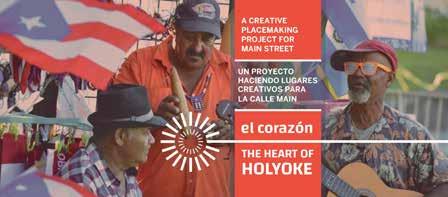
Hay multiples posiciones disponibles:
Enfermeras registradas
Clínicos de salud conductual (consejeros, trabajadores sociales, psicólogos)
Supervisores Clínicos
Profesionales de cuidado especializado directo Posiciones no-clínicas
Asistente de apoyo
Cuento dedicado a Alejandra por José
Edgardo Cruz Figueroa José Edgardo Cruz Figueroa
La casa estaba oscura y callada pero en el cuarto había un grillo que de vez en cuando rasgaba el silencio. En la distancia se oía un coquí intermitentemente. Ya no era como antes cuando la marea de coquíes en el vecindario subía su volumen al compás de la caída de la luz y su cantar se escuchaba toda la noche.
De repente un grupo de perros comenzó a ladrar. Al ratito todos se fueron callando excepto uno. El zumbido de una motora se combinó con los ladridos del perro insistente produciendo una armonía fugaz. El sonido se disipó poco a poco y a medida que se ahogaba, el martilleo de un reloj se oía más duro y más claro. Entonces pasaba un carro y luego otro y con sus brrrrooms alteraban la ecuación del silencio. Mientras uno se alejaba otro se acercaba con el radio encendido y la música se escuchaba con gran fuerza. Luego enmudecía. Era como el ruido de una ventolera que viene y se va.
Esa noche no se había tomado la pastilla de dormir. No le quedaban suficientes para cubrir el resto de su estancia y decidió racionarlas. A las nueve se tiró en la cama a leer y al cabo de tres páginas los ojos se le cerraban. Aprovechó ese desvarío para poner el libro en la mesa de noche, después de escribir un pequeño check mark al final del párrafo hasta donde había llegado.
El grillo estaba callado y la calle también. Su madre hacía rato que estaba dormida y de su cuerpo solo salía un ronquido ocasional. Era como si su aliento de repente cobrara conciencia para hacerse escuchar en el momento en que aspiraba. Esa mezcla de respiración y ronquido era como un dúo de piano y contrabajo tocando un concierto subterráneo.
Un aguacero torrencial interrumpió la calma. En la parte de atrás de la casa, el chorro que salía del desague en el techo se oía como un estruendo al estrellarse contra el concreto, como si el agua tratara de taladrar un hoyo. En otras partes, las gotas esparcidas impactaban el suelo suavemente y sonaban como un rumor. Cuando el agua arreciaba se sentía como una avalancha de arroz en grano.
Cuando llovía, los grillos permanecían absortos, como si escucharan un concierto de jazz o música clásica. No les importaba que las tormentas causaran estragos ni tampoco que LUMA se tardara tres meses en restaurar la luz. Despúes de María muchos habían emigrado pero después de Fiona no tantos. Los que se habían ido lo habían hecho no porque se vieran afectados si no para no abandonar a los puertorriqueños en cuyos cuartos hasta la fecha se habían hospedado. Viajaron en las maletas como polizones, de alguna manera logrando que en agricultura y en las máquinas de seguridad no los detectaran.
Contando las gotas de lluvia, Arturo puso la cabeza en la almohada y se quedó quieto con los ojos abiertos. Con eso lo que hacía era desafiar al sueño. Era llevándole la contraria que lograba que se impusiera. Es decir, como en el boxeo, la mejor forma de caer rendido era peleando. Si cerraba los ojos se mantenía despierto. Con las pupilas en estado de alerta eventualmente se disipaba como cuando uno le baja el volumen a un televisor un decibel tras otro en vez de mutearlo.
Su sueño no duró las horas que esperaba. Fue al comedor a buscar su ordenador. Mientras escribía escuchó otra versión del ronquido de su madre emitido por dos motoras una detrás de la otra. Eran casi las dos de la mañana. Estaba sentado en la cama, recostado contra la pared, con un cojín rojo acolchonando su espalda, analizando la simbiosis de los ruidos de la noche y el silencio.
¿En dónde exactamente estaba el grillo que competía con el coquí que se oía ahora sí y ahora no? El sonido de algunos grillos era una sucesión rápida de cuatro notas en stacatto. Cuatro notas que eran la misma nota, como la samba de Jobim, con un acento en la cuarta: pi pi pi pí. La cuarta nota era seguida por un silencio prolongado que muchas veces se tornaba permanente.
El grillo de su cuarto emitía su cantar en legato. Era como un graznido en una frecuencia bien alta. Su chirriar estaba marcado por acentos que le hacían sonar a la vez constante y quebrado. En el momento en que Arturo se sacudió la sábana, el grillo dejó de cantar. Quizás había adivinado que tenía intención de matarlo. A la vez satisfecho y frustrado, pues había logrado que el grillo se callara pero no había podido liquidarlo, Arturo fue al baño.
Al regresar a la cama se quedó despierto escuchando el silencio. La anticipación del momento en que el grillo reiniciara su canto lo puso en un estado de alerta paradójico: el silencio lo desveló cuando lo que debía haber hecho era lograr que retomara el sueño. Pasadas las cuatro de la mañana era obvio que el grillo se sentía seguro de que nadie lo iba a pisotear. Aún así, no se arriesgó y dejó a Arturo esperando que se pusiera a cantar. Tenía un cerebro de grillo pero no era un pendejo.
Estar sentado escribiendo acentuaba su desvelo. La espalda comenzó a dolerle, resentida por su incómoda posición. El cojín se había deslizado por el espacio entre la pared y la cama y ya no tenía suficiente resguardo. Cerró el ordenador y volvió a recostarse. El silencio fue interrumpido y la paradoja se tornó congruencia. Escuchó el sonido de un muffler reventao, pero apenas por un instante. El grillo permanecía callado pero el tinitus que escuchaba había asumido la forma de su canto. El puñetero grillo se le había metido en la cabeza.
Se movió al comedor para sentarse a la mesa y seguir escribiendo con mayor comodidad. Caminó arrastrando los pies como si estuviera bailando un merengue que sonaba al estilo de Xavier Cugat. En eso no duró mucho. Volvió a cerrar el ordenador y caminó de vuelta a la cama ahora imaginando el sonido de una cumbia. Quizás si mantenía los ojos abiertos como antes, se le cerraban por su propio peso. Mientras tanto, el-grillo-en-su-cabeza retomó su canto y desplazó la cumbia. Ahora era invisible por partida doble pues no se oía él propiamente sino un cantar imaginario.
Después de un rato dando vueltas en la cama escuchó el aria mañanero de varios gallos. Se levantó y en el comedor se comió un bowl de Kellogs Rice Flakes que a su madre le gustaban pensando que eran corn flakes. El tinitus se desvaneció al salir del cuarto. Un perro volvió a ladrar. Se compadeció del dueño pero a lo mejor era un perro realengo y en ese caso pensó que sería un milagro si los residentes de ese vecindario no se organizaban para matarlo. Una cosquilla repentina en la nariz le provocó un estornudo que hizo retumbar la casa. Se sopló la nariz produciendo una melodía breve y desafinada.
continued on page 13
El
continued from page 12
Otro carro pasó por la calle regando el aire con el monótono boom boom boom del bajo en la canción insípida de un reguetonero. Su estómago comenzó a gruñir clamando por algo. A pesar de los rice flakes parecía tener hambre. Le dieron ganas de comerse una chimichanga de grillos y se preguntó cómo hacían los mexicanos para atraparlos, especialmente si sus chapulines eran tan listos como el grillo de su cuarto y al sentirlos venir en son homicida, se recogían calladitos en sus espacios.
Calladitos era un decir pues sus amigos de Oaxaca le habían dicho que cuando no cantaban se les oía respirar. Arturo asintió dirigiéndose a nadie. En Puerto Rico, al respirar no roncaban como su madre. Era un aliento gentil como el de un subibaja desplazando aire con aire. Si eso era un truco de su imaginación, una aflicción causada por la falta de sueño, era lo de menos. No le importaba que las cosas que oía fuesen reales o fantasmales. El sonido es el sonido y el silencio es una de sus caras.
Por más de una hora la casa y la calle se mantuvieron callados. Lo único que se escuchó fue el crujir de los rice flakes en su boca. Era un sonido bucal que se le regaba por el cerebro y no perturbaba a nadie. Más tarde, a la hora en punto, el graznido de un Narcissus Flycatcher se sintió en el reloj de la sala. Su madre tenía uno de esos relojes en la cocina y en la marquesina pero el único que funcionaba era el de la sala. Entre un chirrido y otro de los doce pájaros que sonaban a la una, a las dos, a las cuatro y a las cinco, veinticuatro horas al día, se oía la cadencia rítmica del segundero emitiendo su tac tac.
Arturo escuchó con atención el cantío de los gallos conversando entre ellos en la distancia y también percibió el sonido real de varios pájaros. Recordó el sonido de una trompeta ensartada en el muffler de una motora en Vieques. Imaginó bombas cayendo silbando en el aire. Su madre se escuchó emitiendo un ronquido de ultratumba. Se rascó un brazo y sus uñas sonaron como un rastrillo. Escuchó el impacto leve de la piel que caía en el suelo, acolchonándolo. Se metió en la cama y deslizó la sábana áspera sobre su cuerpo creando un sonido como el pasar de una lija suave. Al otro día, seguro de sí mismo en su habilidad para burlar la muerte, el grillo de su cuarto volvió a cantar.
21 de enero de 2023 - Carolina, Puerto Rico
JOSÉ EDGARDO CRUZ FIGUEROA (cruzjose5319@gmail.com) es natural de San Juan y criado en El Fanguito y Barrio Obrero en Santurce. Tiene una maestría en estudios latinoamericanos con una concentración en literatura de Queens College-CUNY y un doctorado en ciencias políticas del Graduate Center-CUNY. Es profesor en el Departamento de Ciencia Políticas en Rockefeller College, University at Albany-SUNY.
Su trabajo académico ha sido publicado por Temple University Press, Lexington Books y CENTRO Press y su trabajo creativo ha sido publicado en las revistas Confluencia, Sargasso, Cruce, 80grados, Siglo 22 y Latin American Literary Review. Es autor de Liberalism and Identity Politics: Puerto Rican Community Organizations and Collective Action in New York City (2019), Puerto Rican Identity, Political Development, and Democracy in New York, 1960-1990 (2017) y Identity and Power: Puerto Rican Politics and the Challenge of Ethnicity (1998).
continued from page 9
Since 2003, the award has been distributed annually to honor Western Massachusetts educators for their dedication and excellence. More than 100 Western Massachusetts educators are honored each year. This year’s Excellence in Teaching Award winners from Holyoke include:
• Jessica Bresnahan, Sullivan School Grade 7 and 8 English language arts teacher, was nominated for her exemplary teaching practices as a new teacher and for maintaining her classroom as a safe, inclusive space where students are impelled to think critically, use their minds well, problem-solve, and participate in real-world applications.
• Benito Colon, Holyoke High School North’s sole Spanish III teacher and 25-year veteran educator, was nominated for his dedication to his students and community, for setting high academic standards, and for continually refining and growing his practice. This year, he is teaching 135 students, 87% of whom are on track academically in his classes.
• Kimberly Comtois, Lawrence School kindergarten teacher, was nominated for creating an inclusive classroom community for her students and colleagues. Her students each have the opportunity to participate and succeed regardless of learning differences and preferences. Her students regularly engage in discourse and provide feedback to each other.
• Jesenia Dejesus, Holyoke Middle School special education teacher educator, was nominated for her transformational work with students, helping them meet grade-level standards and supporting their socialemotional health. She has experience at multiple schools within the district as both a general education and special education teacher.
• Allison Gonzalez, Kelly School grade 3 inclusion teacher, was nominated for leading dramatic growth in her students’ achievements after taking over the classroom earlier this year. She has implemented consistent rituals and routines including “ready to learn” expectations and practices, and delivers engaging, standards-aligned lessons that meet the needs of her students.
• Luis Robles, Holyoke High School Dean math teacher, was nominated for his problem-solving approach and collaborative work preparing lesson plans and curriculum resources for himself and his colleagues. After five years teaching at HHS North, he moved to Dean this year to assume a new position teaching in three different content areas to students in three grade levels.
The six HPS award recipients will be honored during an in-person banquet at the Log Cabin in Holyoke on May 3, where they will each receive an engraved plaque and a check for $250, along with tuition incentives and scholarships offered by seven major colleges and universities in the region— Elms College, Bay Path University, Mount Holyoke College, Springfield College, Western New England University, Westfield State University, and the University of Massachusetts. Winners will also receive memberships at WGBY and access to thousands of digital education resources, along with three-month memberships at the Springfield Jewish Community Center and at one of six regional YMCAs.
The Excellence in Teaching Awards program, now in its 20th year, is made possible by the Harold Grinspoon Charitable Foundation in partnership with the Irene E. & George A. Davis Foundation.
The impact of COVID-19 has been especially devastating for communities of color. Now, more than ever, independent, local journalism needs your support. El Sol Latino is your local Latinx-owned, independent news source that brings to the front lines diverse Latino voices, perspectives, news and stories.
SUPPORT EL SOL LATINO

 by ROBERT LOPEZ • COLUMBUS, OHIO | TWO DOLLAR RADIO | March
by ROBERT LOPEZ • COLUMBUS, OHIO | TWO DOLLAR RADIO | March
Description:
“A Most Anticipated Book of 2023” --Chicago Review of Books
“That I was born Puerto Rican was happenstance, but that I have no connection to what it means is no accident. My grandparents made conscious decisions and so did my father as part of the first generation born here in the States. And none of it bothered me until recently, which is probably why I can’t quite put my finger on any of this. I’m still grappling with what I’ve lost and how I can miss something I’ve never had.
Robert Lopez’s grandfather Sixto was born in Mayaguez, Puerto Rico, in 1904, immigrating to the United States in the 1920s, where he lived in a racially proportioned apartment complex in East New York, Brooklyn, until his death in 1987. The family’s efforts to assimilate within their new homeland led to the near complete erasure of their heritage, culture, and language within two generations.
Little is known of Sixto—he may have been a longshoreman, a painter, or a boxer, but was most likely a longshoreman—or why he originally decided to leave Puerto Rico, other than that he was a meticulously slow eater who played the standup keyboard and guitar, and enjoyed watching baseball. Through family recollection, the constant banter volleyed across nets within Brooklyn’s diverse tennis community, as well as an imagined fabulist history drawn from Sixto’s remembered traits, in Dispatches From Puerto Nowhere: An American Story of Assimilation and Erasure, Robert Lopez paints a compassionate portrait of family that attempts to bridge the past to the present, and re-claim a heritage threatened by assimilation and erasure.
Editorial Reviews:
“Robert Lopez’s Dispatches From Puerto Nowhere is a stunningly powerful work of family recollection on his grandfather, Sixto, his immigration to the United States in the 1920s, and the effort to assimilate that nearly erased the family’s heritage, culture, and language in just two generations.”
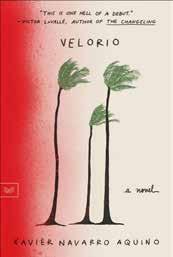
“Our 17 Most Anticipated Books of 2023”
“These dispatches correct each other, question each other, answer each other, and complete each other. What does Robert Lopez dispatch here? Any easy or romantic notion of kinship, ethnicity, and nationality. This book is an ode to what we don’t know about ourselves.” —Eula Biss, author of Having and Being Had, On Immunity, and Notes From No Man’s Land
“Armed with little more than a lifetime of questions, one of this country’s best sentencemaking minds, and the twelfth most popular surname in the United States, Robert Lopez embarks on a journey of selfdiscovery and winds up with the heart of America in his hands: peculiar, beautiful, inspiring, sad.” —John D’Agata, author of Halls of Fame, About a Mountain, and The Lifespan of a Fact
“A masterpiece clear and honest and alive to the world and its contradictions. Dispatches From Puerto Nowhere will hit you where you live.” —Justin Torres, author of We the Animals
Author:
ROBERT LOPEZ is the author of three novels, Part of the World, Kamby Bolongo Mean River, named one of 25 important books of the decade by HTML Giant, and All Back Full; two story collections, Asunder and Good People, and a novel-in-stories titled A Better Class of People. His fiction, nonfiction, and poetry has appeared in dozens of publications, including Bomb, The Threepenny Review, Vice Magazine, New England Review, The Sun, and the Norton Anthology of Sudden Fiction – Latino. He teaches at Stony Brook University and has previously taught at Columbia University, The New School, Pratt Institute, and Syracuse University. He lives in Brooklyn, New York.
by XAVIER NAVARRO AQUINO • New York, NY |HarperVia |Featured on NPR’s WEEKEND EDITION
Set in the wake of Hurricane Maria, Xavier Navarro Aquino’s unforgettable debut novel follows a remarkable group of survivors searching for hope on an island torn apart by both natural disaster and human violence.
Camila is haunted by the death of her sister, Marisol, who was caught by a mudslide during the huracán. Unable to part with Marisol, Camila carries her through town, past the churchyard, and, eventually, to the supposed utopia of Memoria.
Urayoán, the idealistic, yet troubled cult leader of Memoria, has a vision for this new society, one that in his eyes is peaceful and democratic. The paradise he preaches lures in the young, including Bayfish, a boy on the cusp of manhood, and Morivivi, a woman whose outward toughness belies an inner tenderness for her friends. But as the different members of Memoria navigate Urayoán’s fiery rise, they will need to confront his violent authoritarian impulses in order to find a way to reclaim their home.
Velorio - meaning “wake” - is a story of strength, resilience, and hope; a tale of peril and possibility buoyed by the deeply held belief in a people’s ability to unite against those corrupted by power.
Reviews:
“Velorio recognizes that neither utopia nor dystopia are finite states, that they exist alongside and even inside one another, like the hurricane and the eye, the empire and the island. Xavier Navarro Aquino takes us on a riveting, harrowing journey through the aftermath, where the natural violence of the storm is compounded by disaster capitalists; the dead haunt the living; impossible
decisions are made and seemingly impossible futures are born.” — Justin Torres, national bestselling author of We The Animals
“This debut novel traces a group of survivors who fall under the spell of an authoritarian cult leader in the days following Hurricane Maria’s destruction in Puerto Rico. It is deeply imagined and deeply felt – imagistic and strange and haunting – and simmering with grief and rage.”
— Gabriela Garcia, New York Times bestselling author of Of Women and Salt
“Velorio is a novel reckoning with the tragic event of the great Puerto Rican hurricane and a vibrant examination of quiet lives in extremis. It is an assured, brilliant debut from a new, gifted writer.” — Chigozie Obioma, award-winning author of An Orchestra of Minorities
About the Author
XAVIER NAVARRO AQUINO was born and raised in Puerto Rico. His fiction has appeared in Tin House, McSweeney’s Quarterly Concern, and Guernica. He has been awarded scholarships from the Bread Loaf Writers’ Conference, the Sewanee Writers’ Conference, a MacDowell Fellowship, and an ACLS Emerging Voices Fellowship at Dartmouth College. Aquino is currently an Assistant Professor of English at the University of Notre Dame where he teaches in the MFA program.


SPRINGFIELD, MA | SPRINGFIELD TECHNICAL COMMUNITY COLLEGE | March 22, 2023 – Springfield Technical Community College wrestling team won fourth place at the National Collegiate Wrestling Association Championships at the Puerto Rico Convention Center with eight studentathletes returning as All-Americans.
Student James Lunt said he was proud to be crowned a champion and capture first place in his weight class. “It was awesome. I had the tournament of my life there,” he said.
But he was quick to add that he loved the experience of traveling to Puerto Rico for the first time. “That’s what I was most excited for – the food!” he said. Other wrestlers, some of whom have Puerto Rican roots, said they enjoyed visiting the island, experiencing the culture and soaking up the sun in addition to having the chance to compete in the nationals.
“I was there once for a family vacation,” said Davyn Peterson, who is Puerto Rican and Black. “To go there for a wrestling tournament was really fun.” Coach Alberto Nieves said he was proud of the team for their hard work all season.
“I’m thankful to the administration at STCC who made this possible,” Nieves said. “This was a special and unforgettable experience for the team. They were able to see how people live in Puerto Rico. They worked out with students at the University of Puerto Rico. They visited some beautiful beaches and enjoyed authentic Puerto Rican food.”
STCC secured fourth place with 133.5 team points at the national tournament held March 9-11 in San Juan. They advanced to the nationals after winning the NCWA Northeast Conference Championships title on Feb. 25. Three student wrestlers were named to the National Wrestling Coaches
Association All-Academic Team for 2022-2023: Ryan Williams and brothers Ricardo and Stephano Magny.
STCC Vice President of Student Affairs Darcey Kemp said she was proud of the team’s accomplishment and thrilled they had an opportunity to experience Puerto Rico.
Rico
“I applaud them for their hard work and determination this year,” Kemp said. “We encourage our students to get involved, which opens the door to exciting opportunities like competing at the national level in Puerto Rico. Congratulations to Coach Nieves and his team for a job well done!”
Student Dylan Beddow of Agawam said he overcame injuries this season to compete in the nationals. “You can physically and mentally give your all to wrestling,” he said. “People show their heart for the sport, which is the best thing to see.”
Here are the STCC wrestlers and where they finished in their weight classes at the tournament:
• Dylan Beddow, 125 pounds, 4th
• Michael Gonzalez, 133 pounds 6th
• Kalil Shabazz, 141 pounds, 6th
• James Lunt, 157 pounds, Champion, 1st
• Jolan Martori, 165 pounds, 4th
• Stephano Magny, 184 pounds, 7th
• Davyn Peterson, 197 pounds, 8th
• Shawn Conniff, 235 pounds, 5th
Interested in applying to STCC? Visit stcc.edu/apply or call Admissions at (413) 755-3333.
UMass Fine Arts Center continúa su Temporada 2023 con una fascinante programación de conciertos, danza, and teatro.
Miércoles, 19 de abril, 7:30 p.m. | Bowker Auditorium
Entrada General $33 - Jóvenes menores de 17 y estudiantes de los Five College $10
La cantautora residente en Austin, Gina Chávez, combina los sonidos de las Américas con tensión y gracia. Sólo la segunda artista de Austin y la tercera Latina nacida en los EE.UU. continentales en recibir una nominación al Latin Grammy en la historia de los premios, esta artista queer, bilingüe y fusionadora de géneros es una profesional cuyo talento hay que reconocer.

Chávez, ganadora de 12 premios Austin Music Award (sus honores incluyen Vocalista Femenina del Año en 2019 y Músico del Año de Austin en 2015), explora el verdadero significado de “Americana” mientras ella y su banda llevan al público en un viaje lleno de energía a través de Latinoamérica. Su apasionante colección de canciones bilingües que atraviesan la cumbia, la rumba y el soul llevan al público en un viaje de descubrimiento de sus raíces Latinas.

Asian and Asian American Arts and Culture Program
Co-presented with UMass Bach Festival
Sábado, 23 de abril 3:30 p.m. | Bowker Auditorium
Asientos Reservados $20 y $30 - Jóvenes menores de 17 y estudiantes de los Five College $10
Co-presentado por el UMass Bach Festival y nuestra serie de artes y activismo Codemakers, este evento único en su clase presenta nuevas obras relacionadas con Bach de destacadas artistas asiático-americanas de música clásica y danza, encomendado por el Fine Arts Center.
Una de las bailarinas más increíbles del New York City Ballet, Georgina Pazcoguin, y la influyente coreógrafa posmodernista Donna Uchizono, exploran sus múltiples identidades en la actuación Occidental. Trabajando con fugue como metáfora de la identidad diaspórica, la violinista Hyeyung Sol Yoon y la compositora Texu Kim se inspiran en la sonata para violín en C Mayor de Bach en una nuevo solo de violín.
Política de Salud y Seguridad COVID-19: El Centro de Bellas Artes se adherirá a las políticas actuales de la Universidad de Massachusetts Amherst. Para mas información visite la guía actualizada para los eventos en el campus
UMass Amherst: www.umass.edu/coronavirus/news/public-health-preparations-fall-semester
Para nuestra programación de la temporada completa o boletos de entrada llamar al: 413-545-2511 ó al 800-999-UMAS ó en línea fineartscenter.com